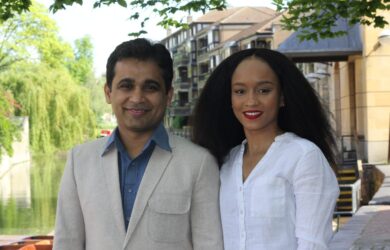
Alumna Gillean Denny is taking time out of architecture projects to write a series of novels.
I’ve always been someone who works best to deadlines and on multiple projects.
Gillean Denny
When she was a child, Gillean Denny’s father would give her and her siblings spiral bound notebooks to write stories over the summer holidays. They got one cent for each word they wrote and five cents were taken off for every spelling mistake or grammar error.
It instilled in her an early ability to write and at 14 she and her best friend were invited to dinner with her favourite author who was visiting her home town of Philadelphia. “That night I decided I was going to be a published author before I got to 30,” she says.
Her pledge has almost come true. With several academic publishings to her credit, Gillean finished and edited the draft of her first novel by the time she turned 30, secured an agent and is in the middle of writing the second installment of her children’s series. The children’s series idea has been kicking around for at least 10 years and around 30 other novels remain in her hard drive unfinished. What slowed her down was the fact that writing is not her only talent.
Theatre
Gillean [2008] shares a passion for theatre with several of her four siblings and she took part in many community and school productions while she was growing up. She has worked with two theatres in the Philadelphia area and was originally considering training in art production movie sets until a teacher suggested architecture. Her father in particular stressed the value of getting a ‘proper career’ so architecture seemed the perfect solution, allowing her to combine theatre and a solid professional training.
After five years studying architecture at Penn State University, she won Gates scholarships to Cambridge to do her MPhil (2007) and PhD (2008). At the same time she managed to maintain her interest in theatre, designing and building sets for theatres in Philadelphia, Cambridge, London, the Minack Theatre in Cornwall, and touring productions.
She had the advantage of growing up in a house where her father spent quite a lot of his spare time remodelling the house, taking the roof off to build a new storey or taking walls down. “There was always a pile of timber in the backyard,” says Gillean. “The result was that we all had to know about construction work.” It’s a skill that came in handy since she decided to dedicate herself to architecture.
Architecture
At Penn State University, she had become interested in sustainable architecture and had taken part in the 2007 Solar Decathlon Project, an international competition sponsored by the US Department of Energy to design, build and operate the most attractive, practical and energy-efficient solar-powered home. Gillean’s team won fourth place with their 800 foot square home which had off grid power. They took the house to Washington and had around half a million visitors tour the structure over its one month display.
At Cambridge she was part of a team hoping to enter the European version of the same competition. Unfortunately, Cambridge’s unique term times limited student involvement and the project was ultimately submitted, by a reduced team, to an environmental design building conference instead. Gillean however, argued for the merit of such a sustainable building project within the engineering undergraduate curriculum. “My thinking was that if the project was integrated into the course work then students could dedicate the time they needed to it,” she says.
Through all the theatre and building projects, Gillean also found time to complete her own research. For her MPhil, Gillean examined the role of an allotment in fostering a sustainable lifestyle for UK residents. This topic was broadened a year later and her PhD sought to understand the disparity in greenhouse gas emissions associated with traditional produce production, distribution, and consumption and that of urban agriculture. Ultimately she found that the type of fresh fruit or vegetable and the time of year they were grown/eaten reflected better or worse for all forms of growing, but that having dedicated urban small farms was the most environmentally beneficial.
Gillean also threw herself into College life, designing for the May Balls of Sidney Sussex College and Jesus College , as well as the inaugural Gates Fall Ball. Among other activities, she is also a prolific graphic designer, was the graduate representative for architecture, and worked from 2009-2014 as the architecture teacher for The Cambridge Tradition of the Oxbridge Academic programmes, a summer programme for international students.
Gillean submitted her thesis in July 2012 and went to Japan to visit her sister. Due to an administrative delay, she didn’t have her viva until October.
China
After getting married in 2013, she and her husband set up home in Canada where Gillean continued to do international design projects, graphic design and write. One of her most ambitious projects was for a primate centre in China, working with a fellow colleague from the Oxbridge Academic programmes. “It would have been a complete reimagination of a primate zoological centre in Asia where many zoos are little more than run-down circuses,” says Gillean. Two years in, the project was put aside for a later date, but despite the setback, Gillean says she learnt a lot during the process and hopes it will eventually be realised.
When the project fell through, in early 2015, Gillean was pregnant with her daughter Aurelie Grace, who is now 11 months old. In fact she spent much of her early pregnancy travelling all over the world, working on the project.
Because she is self employed, Gillean did not take maternity leave and is working part time around Aurelie’s sleep patterns and at weekends. Aurelie’s birth gave Gillean an opportunity to have a big rethink about what she wanted to do while her baby was still small.
Family life
Now pregnant with her second child, Gillean is keen to be a stay at home mum – as her own mother was – so she had to think about what would work around her children. Writing seemed an ideal choice. She had finished writing one book just before Aurelie was born and got a positive response from Canada’s top literary agency a few weeks later. They advised her to finish the second book since publishers would be more likely to publish if they had two books in hand. She is now editing the first and writing the second.
“I’ve always been someone who works best to deadlines and on multiple projects,” she says. She thinks she is a more efficient writer now she is a mum and has only short bursts in which to write than before. The first book started as an adult fantasy, but the back story became so interesting that she decided to change tactics and it became about children. Gillean says the writing process has been a massive learning curve writing for children in terms of the vocabulary, grammar and sentence structure she uses and the depth of the concepts she talks about.
In addition to her writing, Gillean also plans to do some graphic design projects while her children are young. Once they start school, she would like to return to teaching architecture, which she loves.
She is still in touch with a close group of Gates Cambridge Scholars and is one of the first to have children. “It will be interesting to watch how we cope with the demands of work and family life,” she says. “I don’t think you can do everything at the same time. You have to prioritise and I have prioritised being a stay at home mum for the time being but still working. Luckily, I have the benefit that I was already working from home before.”
Picture credit: Wiki Commons.












